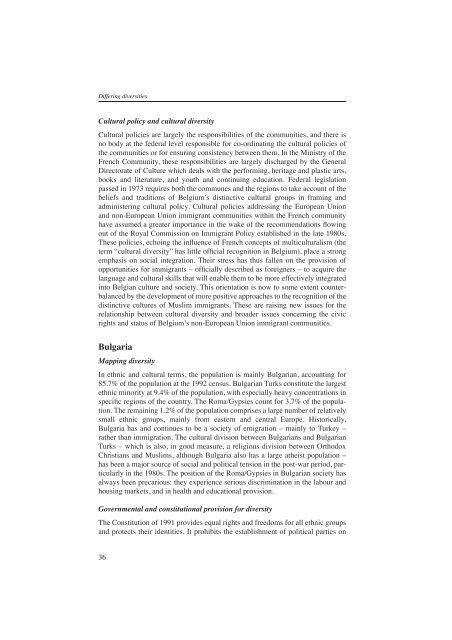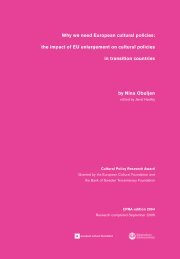Tony Bennett, Differing diversities - Council of Europe
Tony Bennett, Differing diversities - Council of Europe
Tony Bennett, Differing diversities - Council of Europe
You also want an ePaper? Increase the reach of your titles
YUMPU automatically turns print PDFs into web optimized ePapers that Google loves.
<strong>Differing</strong> <strong>diversities</strong>Cultural policy and cultural diversityCultural policies are largely the responsibilities <strong>of</strong> the communities, and there isno body at the federal level responsible for co-ordinating the cultural policies <strong>of</strong>the communities or for ensuring consistency between them. In the Ministry <strong>of</strong> theFrench Community, these responsibilities are largely discharged by the GeneralDirectorate <strong>of</strong> Culture which deals with the performing, heritage and plastic arts,books and literature, and youth and continuing education. Federal legislationpassed in 1973 requires both the communes and the regions to take account <strong>of</strong> thebeliefs and traditions <strong>of</strong> Belgium’s distinctive cultural groups in framing andadministering cultural policy. Cultural policies addressing the <strong>Europe</strong>an Unionand non-<strong>Europe</strong>an Union immigrant communities within the French communityhave assumed a greater importance in the wake <strong>of</strong> the recommendations flowingout <strong>of</strong> the Royal Commission on Immigrant Policy established in the late 1980s.These policies, echoing the influence <strong>of</strong> French concepts <strong>of</strong> multiculturalism (theterm “cultural diversity” has little <strong>of</strong>ficial recognition in Belgium), place a strongemphasis on social integration. Their stress has thus fallen on the provision <strong>of</strong>opportunities for immigrants – <strong>of</strong>ficially described as foreigners – to acquire thelanguage and cultural skills that will enable them to be more effectively integratedinto Belgian culture and society. This orientation is now to some extent counterbalancedby the development <strong>of</strong> more positive approaches to the recognition <strong>of</strong> thedistinctive cultures <strong>of</strong> Muslim immigrants. These are raising new issues for therelationship between cultural diversity and broader issues concerning the civicrights and status <strong>of</strong> Belgium’s non-<strong>Europe</strong>an Union immigrant communities.BulgariaMapping diversityIn ethnic and cultural terms, the population is mainly Bulgarian, accounting for85.7% <strong>of</strong> the population at the 1992 census. Bulgarian Turks constitute the largestethnic minority at 9.4% <strong>of</strong> the population, with especially heavy concentrations inspecific regions <strong>of</strong> the country. The Roma/Gypsies count for 3.7% <strong>of</strong> the population.The remaining 1.2% <strong>of</strong> the population comprises a large number <strong>of</strong> relativelysmall ethnic groups, mainly from eastern and central <strong>Europe</strong>. Historically,Bulgaria has and continues to be a society <strong>of</strong> emigration – mainly to Turkey –rather than immigration. The cultural division between Bulgarians and BulgarianTurks – which is also, in good measure, a religious division between OrthodoxChristians and Muslims, although Bulgaria also has a large atheist population –has been a major source <strong>of</strong> social and political tension in the post-war period, particularlyin the 1980s. The position <strong>of</strong> the Roma/Gypsies in Bulgarian society hasalways been precarious: they experience serious discrimination in the labour andhousing markets, and in health and educational provision.Governmental and constitutional provision for diversityThe Constitution <strong>of</strong> 1991 provides equal rights and freedoms for all ethnic groupsand protects their identities. It prohibits the establishment <strong>of</strong> political parties on36














